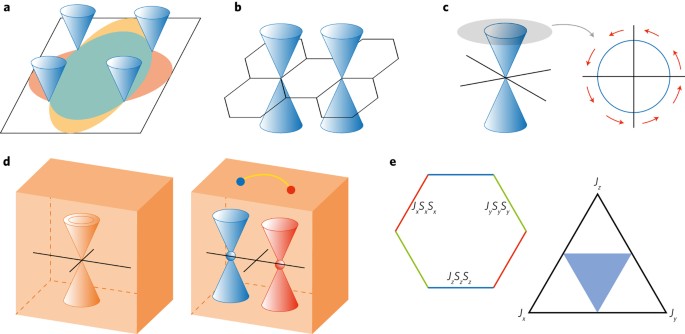How Quantum Materials Work and Why They Matter

Quantum materials are materials that exhibit quantum effects. These effects are due to the wave-like nature of electrons and other particles, and they can lead to some very strange and wonderful properties.
One of the most important quantum effects is quantum entanglement. This is a phenomenon in which two particles are linked together in such a way that they share the same fate, no matter how far apart they are. This means that if you measure the state of one particle, you instantly know the state of the other particle, even if they are separated by a large distance.
Advertisement

Another important quantum effect is quantum tunneling. This is the ability of particles to pass through barriers that they would not be able to pass through classically. This is because particles have a wave-like nature, and they can "tunnel" through the barrier by passing through the empty space between the atoms.
Advertisement

Advertisement
Quantum materials can exhibit a wide range of other quantum effects, such as superconductivity, magnetism, and optical properties. These effects can be used to create new and innovative devices, such as quantum computers, quantum sensors, and quantum lasers.
Why Quantum Materials Matter
Quantum materials have the potential to revolutionize many fields, such as electronics, energy, and medicine. For example, quantum computers could be used to solve problems that are intractable for classical computers. Quantum sensors could be used to detect objects and substances that are invisible to traditional sensors. And quantum materials could be used to create new drugs and treatments for diseases.
The Future of Quantum Materials
The field of quantum materials is still in its early stages, but it is rapidly growing. There is a lot of research being done on new quantum materials, and there is a lot of potential for new applications. As the field continues to develop, we can expect to see even more exciting advances in the years to come.
Here are some examples of quantum materials:
- Superconductors: These materials conduct electricity with no resistance. This means that they can carry current with no energy loss, which makes them very efficient. Superconductors are used in MRI machines, particle accelerators, and other high-tech devices.
- Magnetic materials: These materials have a strong magnetic field. They are used in hard drives, credit cards, and other devices.
- Topological insulators: These materials conduct electricity on their surface, but they are insulating on the inside. This makes them very good at conducting electricity without losing energy. Topological insulators are being studied for use in quantum computers and other devices.
- Dirac materials: These materials have electrons that behave like massless particles. This gives them some very unusual properties, such as the ability to conduct electricity without resistance. Dirac materials are being studied for use in quantum computers and other devices.
Advertisement
The Future of Quantum Materials
The field of quantum materials is still in its early stages, but it is rapidly growing. There is a lot of research being done on new quantum materials, and there is a lot of potential for new applications. As the field continues to develop, we can expect to see even more exciting advances in the years to come.
Conclusion
Quantum materials are a fascinating new field of research with the potential to revolutionize many fields. As the field continues to develop, we can expect to see even more exciting advances in the years to come.
Advertisement